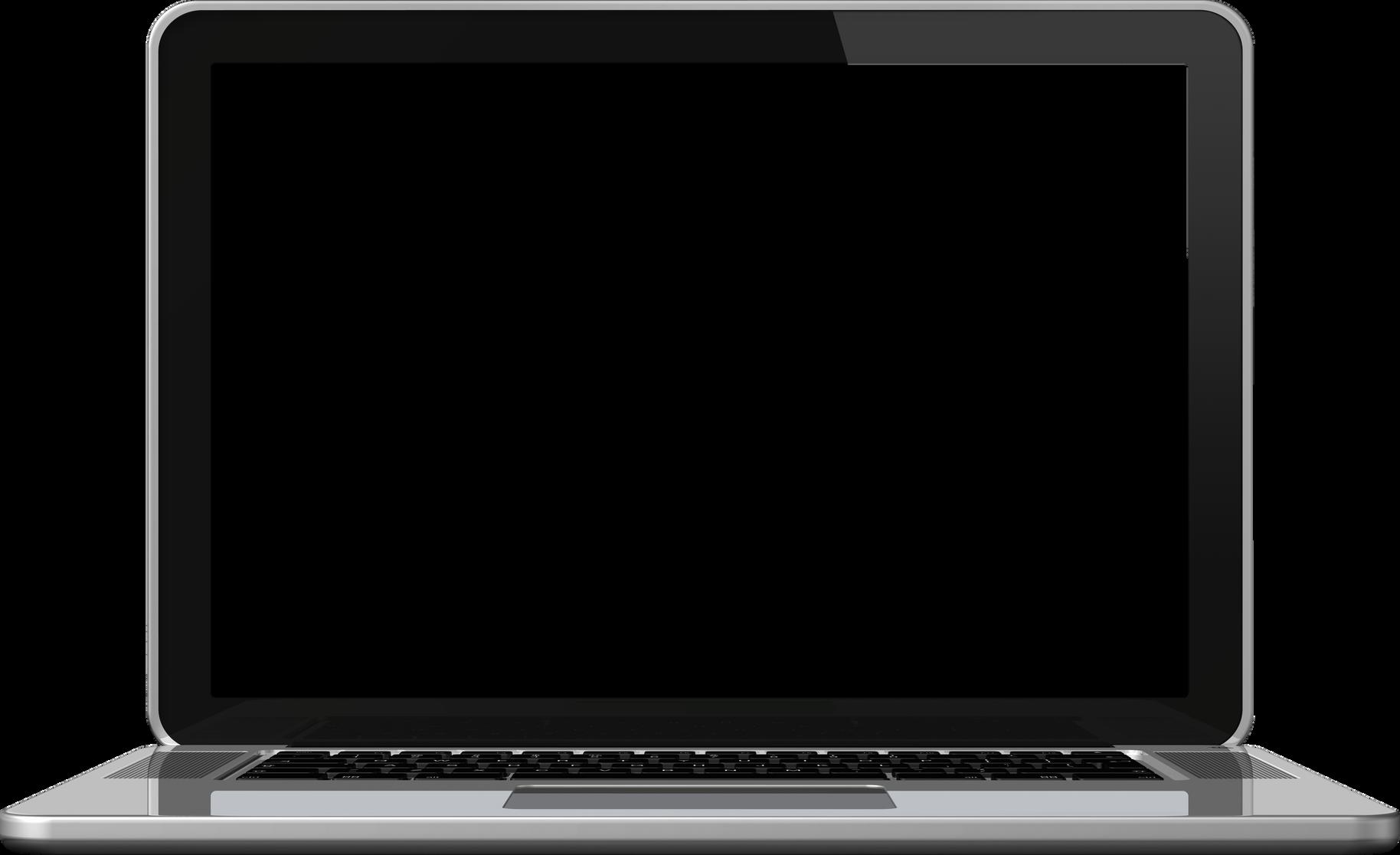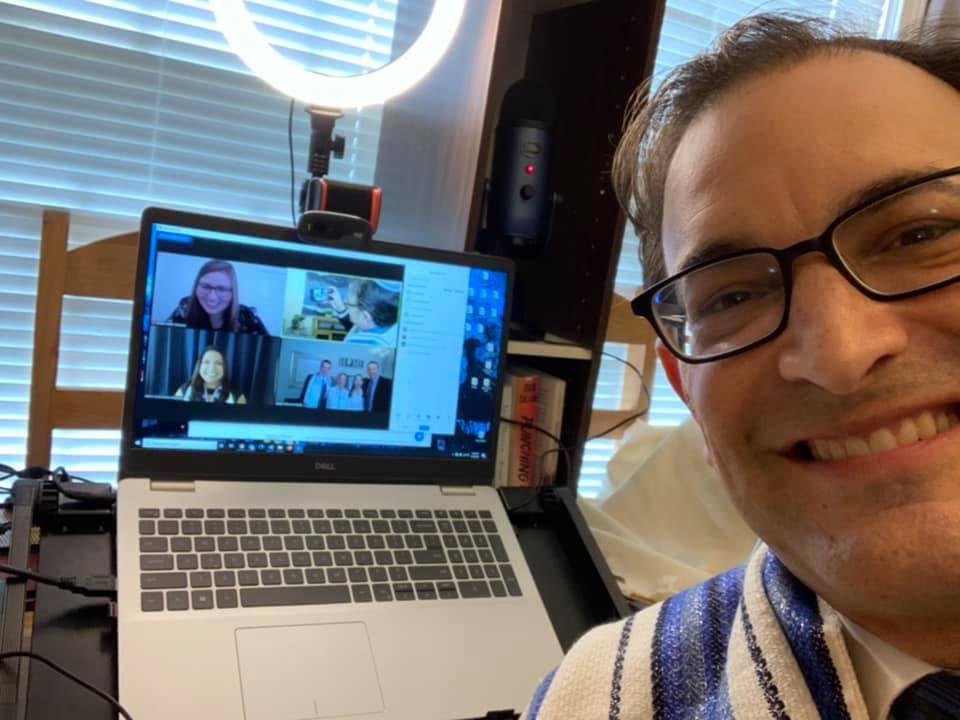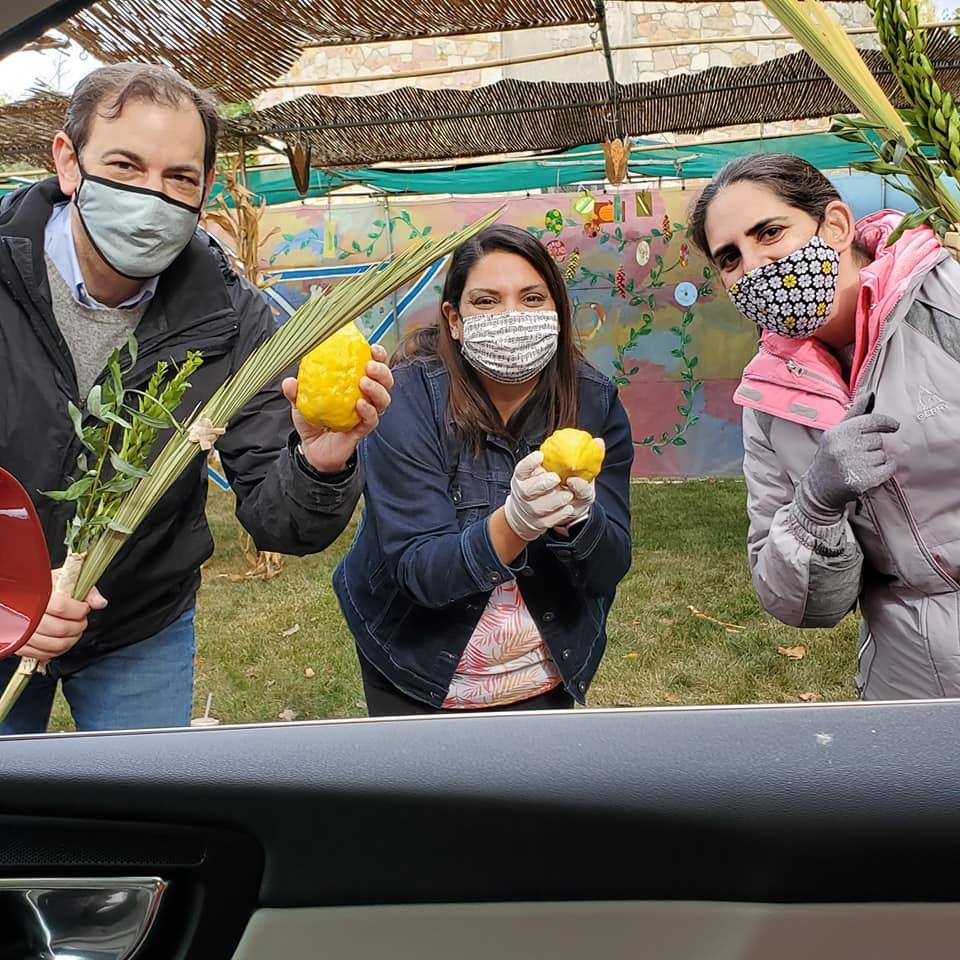
10 minute read
Rewind & Reflect: Our Temple ' s 2020 history: pgs
This March marks two years since our world changed in ways we never could have imagined. As we reflect and remember the lives lost and the lives forever altered during the COVID-19 pandemic, we also look back at how the IHC community rose to the challenges of unprecedented times. IHC librarian Evelyn Pockrass recalls what unfurled within our congregation in the year 2020.
March
Advertisement
On March 4, a message was sent to IHC congregants noting the congregation was taking steps to be certain the building's surfaces were cleaned thoroughly and that our leadership was monitoring the situation closely. We were told that, as of February 28, the Centers for Disease Control and Prevention (CDC) had said that currently there was “low” risk for an outbreak in the United States. Within a short period of time, circumstances changed completely and the members of IHC, along with the rest of the country, were about to experience a once-in-a-century event: a global pandemic.

By March 12, we learned that beginning Sunday, March 15, all programs in the building would be suspended until April 12. It was hoped that programming would be resumed by mid-April. The following day we were told the Early Childhood Center (ECC), the Jewish Learning Program (Religious School), all Youth Groups, task forces, and committee meetings would be going online if possible. The building was being closed to all congregants and visitors.
IHC became a virtual congregation on March 19. “We Are Here for You.
” became an oft-repeated sentiment not only for our members but throughout the city, state, and country. We were going to help “flatten the curve” (remember that phrase?).

Starting March 20, services would be live-streamed. Hoosiers, who were not in “essential” work as defined by the state, were asked to stay home. IHC staff would be working remotely wherever possible. The last full workday in the building was March 16, but staff would be available by phone or email. Leadership would be working on new and creative ways to maintain their connection with congregants. They were adhering to the guidelines of the CDC and in touch with congregations in Indianapolis as well as congregations within the Reform Movement.
Cantor Aviva Marer arranged for a virtual Meditative Musical Healing event on March 24. Rabbi Roxanne Shapiro gave a tutorial on using Zoom, the online connection program new to many but the link for individuals and institutions to converse with family, friends, congregants, and business associates. Modern technology became a lifeline in the months to come.
April
The curve did not flatten, and in April there was a flurry of cancellations of in-person programs and events: b’nai mitzvah celebrations had to be re-thought and rescheduled, LAF (Life After Fifty) programming went online, Mitzvah Stitchers and others were sewing masks, ECC teachers were making videos that could be accessed at any time. Parents and families of school-age children were encountering the challenges and opportunities of having their children learning virtually at home. Often adults were homebound, too, working remotely, with some facing temporary or permanent layoffs.
Gradually, we were hearing of more and more cases of citizens contracting, some dying, of what came to be called COVID19. But April also brought the celebration of Passover. How could we observe the family oriented seder? Some followed CDC guidelines of not having indoor gatherings of more than 10 people; others experimented with a virtual seder in the hope that next year they would be able to gather in person again. The IHC YouTube channel allowed staff and congregants to display skills by offering several videos about the holiday.
May brought warmer weather, a brief reprieve in the COVID-19 surge and the hope for the easing of restrictions such as mask wearing and social distancing. Staff would come to the building more frequently but, aside from financial business concerns, most staff worked primarily from home. Activities such as Shabbat services, Jewish Learning Program, Hebrew Intensives, and Derech Torah continued online. Meetings and programs were held virtually. That included most committees, Jewish Book Club, and Adult Education classes. On Sunday, May 17, IHC’s annual meeting was conducted virtually. Marc Katz was our outgoing president and Eloise Paul became the new IHC president for the Board of Directors. A COVID-19 Emergency Fund appeal began to help sustain the congregation financially. At the end of the month, on May 29, we held our farewell Shabbat for Rabbi Scott Fox who was leaving for a pulpit in Long Beach, California. An online Confirmation and Shavuot service took place May 30.
June
In June, President Eloise Paul encouraged congregants to join committees, Stefanie Shapiro joined the staff as the Learning Experience Coordinator (a combination of a few past positions: including coordinating the Derech Torah program – Debbi Kasper had retired from that post – and the Hebrew Intensives setup). Some committee meetings and Thursday “Coffee With the Clergy” meetings were scheduled in June as we took a little breather and started wondering in earnest about fall programming, particularly when the Early Childhood Center would reopen and the plan for the upcoming High Holy Days.
July
We looked to the Back to the Building committee for guidance. At first they met weekly and later were able to hold fewer meetings. Members of the committee measured and assessed the needs for the sanctuary to be safe for the clergy to conduct services and with a limited number of attendees (based on local governmental directives). They arranged for N95 masks, trained volunteers as greeters, initiated policies about entering and exiting the building for the ECC to reopen, etc.
In July, we welcomed Rabbi Jordana Chernow-Reader as our new Associate Rabbi. President Paul let us know that a strategic planning committee had been formed and was conducting a listening campaign throughout July. One or more of each of these meetings would be focused on individual topics: cultural arts, engagement, fiscal, Israel, lifelong learning, philanthropy, social justice, and worship/ritual. Sisterhood had a cocktails and conversation event that featured a Woman’s Survival guide, there was an adult education course on prayerbook Hebrew, and Tot Shabbat was held online every Friday morning. IHC was looking for a new accounting assistant. Adrienne Aronson-White kindly took on that position the following month.

On July 11, a message from President Paul informed us that the listening campaign clearly reflected congregants’ wishes for more transparency and better communications. We had applied for a government loan. Federal requirements kept changing, but thanks to the efforts of Kathy Madvig, Accounting Manager, we did receive the loan. It had cut expenses by several hundred thousand dollars but, were still looking to end the year about $300,000 in the red. Therefore, we were having another appeal for funds and already had a challenge grant.
August
August saw the re-opening of both the Gift Shop, with concierge service available, and the ECC. It was announced that all High Holy Day services would be virtual. For the Yom Kippur Yizkor service, Brotherhood would make the Elmer Wolhfeld Memorial Book accessible online with a limited number of printed copies. High Holy Day prayerbooks could be borrowed from the temple. Due to COVID-19, the Family Promise program (Interfaith Hospitality Network) could not be offered in the building, but apartments were being secured for homeless families and we were asked to donate specific items.
Angela Eubanks became the interim director of the ECC (Taryn Fartouh had resigned). Other programs continued online, mostly on Zoom. Happy news – on August 1, the congregation celebrated another previously postponed event, the baby naming of Sofia Eve Marer (now a one-year-old), daughter of Jim and Cantor Aviva Marer.

November
September featured more online offerings including all sessions of the Jewish Learning Program. For the upcoming start of 5781, our resilient, creative clergy and staff provided congregants and the community with a virtual Selichot service featuring Nefesh Mountain. There were several online High Holy Day services, four drive-in parking lot Shofar services at various sites in Indianapolis and Carmel, and a Yom Kippur Healing Service, among others. Communal services at the North and South cemeteries were not held.
October
Virtual programming flourished, as did COVID-19 – another surge of cases developed. Despite successful results of initial vaccine testing by certain pharmaceutical companies, it still would be a while before we would see the end of this pandemic. Nonetheless, we celebrated Sukkot and Simhat Torah online in October encompassing a Sisters in the Sukkah event, new Lunch and Learn programs, a pet blessing Shabbat, Music in Bloom, youth group activities and programs.
On October 21, President Paul and Rabbi Krichiver let us know that Dan Silien, our executive director, had informed the Board he would be leaving. Dan sent a note to the congregation thanking us for the work we do and for the opportunity to have been a part of IHC for the past few years. His responsibilities were split between staff and laity for the next several months. Matt Hastings, Youth Engagement Coordinator assumed the main responsibility for building issues. Eloise Paul took on many of the other questions that arose during this period while a search committee worked online to find candidates for the executive director position.
Programs and activities moved along at a steady pace despite all the recent changes. Families of b’nai mitzvah children were given the option of having in-person observances with restrictions on the number of attendees, the requirement to wear masks and social distance. Others opted to wait until sometime in 2021 when they hoped restrictions would be eased. There were four weekly programs on "Jews and Race: What Black Lives Matter Means to Jews" , starting October 29, and in November Rabbi Krichiver participated in a discussion about Indiana Jews versus the KKK. An Oneg Shabbat Zoom games session was held after the Thanksgiving Shabbat service. A traditional Thanksgiving celebration itself was not the usual holiday gathering for family and friends.
To further the goal of being here for one another, there was a series of adult education offerings entitled "Audacity of Hope: Using the Psalms to Connect" , starting December 1. The Brit Olam committee sponsored a program on "Eviction: Poverty and Profit in the American City" . LAF offered Around the Jewish Table programming and a Hanukkah blood drive was scheduled, Sisterhood held a Super Sunday in-store shopping event at the Gift Shop. A Hanukkah drive-thru happened in the South parking lot where sweets and treats were distributed. WFYI, the local PBS station, aired a documentary, “To Know Your Neighbors, ” that included a mention of IHC.
As the virtual Hanukkah celebrations faded and the secular year drew to a close, the clergy, staff and the board of directors wished the entire IHC family a happy, healthy and safe New Year. Now we could reflect on what an unusual year 2020 had been, what 2021 would be like with the onset of mass vaccinations, and wonder if the pandemic ever would end. What challenges would lie ahead for ourselves, our country and the world as we entered 2021?
December


